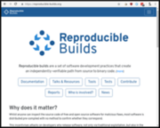Freexian Collaborators: Debian Contributions: Core python package, Redmine backports, and more! (by Utkarsh Gupta, Stefano Rivera)
 Contributing to Debian is part of
Freexian s mission. This article covers the latest
achievements of Freexian and their collaborators. All of this is made
possible by organizations subscribing to our Long Term Support
contracts and consulting services.
Contributing to Debian is part of
Freexian s mission. This article covers the latest
achievements of Freexian and their collaborators. All of this is made
possible by organizations subscribing to our Long Term Support
contracts and consulting services.
Core Python Packages, by Stefano Rivera
Just before the freeze, pip added support for PEP-668.
This is a scheme devised by Debian with other distributions and the Python
Packaging Authority, to allow distributors to mark Python installations as
being managed by a distribution package manager. When this EXTERNALLY-MANAGED
flag is present, installers like pip will refuse to install packages outside
a virtual environment. This protects users from breaking unrelated software
on their systems, when installing packages with pip or similar tools. Stefano
quickly got this version of pip into the archive, marked Debian s Python
interpreters as EXTERNALLY-MANAGED, and worked with the upstream to add a
mechanism to allow users to override the restriction. Debian bookworm will
likely be the first distro release to implement this change.
The transition from Python 3.10 to 3.11 was one of the last to complete before
the bookworm freeze (as 3.11 only released at the end of October 2022). Stefano
helped port some Python packages to 3.11, in January, and also kicked off the
final transition to remove Python 3.10 support.
Stefano did a big round of bug triage in the cPython interpreter (and related)
packages, applying some provided patches, and fixing some long-standing minor
bugs in the packaging.
To allow Debian packages to more accurately reflect upstream-specified
dependencies that only apply under specific Python interpreter versions, in the
future, Stefano
added more metadata
to the python3 binary package.
Python s unittest runner would successfully exit with 0 passed tests, if it
couldn t find any tests. This means that configuration / layout changes can
cause test failures to go unnoticed, because the tests aren t being run any
more in Debian packages. Stefano
proposed a change to Python
3.12 to change this behavior and treat 0 tests as a kind of failure.
debvm, by Helmut Grohne
With support from Johannes Schauer Marin Rodrigues, and Jochen Sprickerhof,
Helmut Grohne wrote debvm, a tool for
quickly creating and running Debian virtual machine images for various
architectures and Debian and Ubuntu releases. This is meant for development
and testing purposes and has already identified a number of bugs in e.g.
fakechroot (#1029490), Linux
(#1029270), and runit
(#1028181).
Rails 6 and Redmine 5 available in bullseye-backports, by Utkarsh Gupta
Bullseye users can now upgrade to the latest 6.1 branch of Rails, v6.1.7, and
the latest Redmine version, v5.0.4. The Ruby team received numerous requests
to backport the latest version of Rails and Redmine, especially since there was
no redmine shipped in the bullseye release itself. So this is big news for all
users as we ve not only successfully backported both the packages, but also
fixed all the CVEs and RC bugs in the process!
This work was sponsored by Entrouvert.
Patches metadata in the Package Tracker, by Rapha l Hertzog
Building on the great Ultimate Debian Database work of Lucas Nussbaum and on
his suggestion, Rapha l enhanced the
Debian Package Tracker to display action items
when the patches metadata indicate that some patches were not forwarded
upstream, or when the metadata were invalid. One can now also browse the
patches metadata from the Links panel on the right.
Fixed kernel bug that broke debian-installer on computers with Mediatek wifi devices, by Helmut Grohne
As part of our regular work on Kali Linux for OffSec,
they funded Helmut s work to fix the MT7921e driver. When being loaded without
firmware available, it would not register itself, but upon module release it
would unregister itself causing a kernel oops.
This was commonly observed in Kali Linux when reloading the module to add
firmware. Helmut Grohne identified the cause and
sent a patch, a
different variant of which is now
heading into Linux
and available from Kali Linux.
Printing in Debian, by Thorsten Alteholz
There are about 40 packages in Debian that take care of sending output to
printers, scan documents, or even send documents to fax machines. In the light
of the upcoming/already ongoing freeze, these packages had to be updated to
the latest version and bugs had to be fixed. Basically this applies to large
packages like cups, cups-filters, hplip but also the smaller ones that
shouldn t be neglected. All in all Thorsten uploaded 13 packages with new
upstream versions or improved packaging and could resolve 14 bugs. Further
triaging led to 35 bugs that could be closed, either because they were already
fixed and not closed in an earlier upload or they could not be reproduced with
current software versions.
There is also work to do to prepare for the future. Historically, printing on
Linux required finding a PPD file for your printer and finding some software
that is able to render your documents with this PPD. These days, driverless
printing is becoming more common and the use of PPD files has decreased.
In the upcoming version 3.0 of cups, PPD files are no longer supported and so
called printer applications need to be used. In order not to lose the ability
to print documents, this big transition needs to be carefully planned. This
started in the beginning of 2023 and will hopefully be finished with the
release of Debian Trixie. More information can be found in
this Debian Printing Wiki article.
In preparation for this transition Thorsten created three new packages.
Yade update, by Anton Gladky
Last month, Anton updated the yade package to the newest 2023.02a version,
which includes new features.
Yade is a software package for discrete element method (DEM) simulations, which
are widely used in scientific and engineering fields for the simulation of
granular systems. Yade is an open-source project that is being used worldwide
for different tasks, such as geomechanics, civil engineering, mining, and
materials science.
The Yade package in Debian supports different precision levels for its
simulations. This means that researchers and engineers can select the needed
precision level without recompiling the package, saving time and effort.
Miscellaneous contributions
- Helmut Grohne continues to improve cross building (mostly Qt) and
architecture bootstrap (mostly loong64 and musl).
Rails 6 and Redmine 5 available in bullseye-backports, by Utkarsh Gupta
Bullseye users can now upgrade to the latest 6.1 branch of Rails, v6.1.7, and
the latest Redmine version, v5.0.4. The Ruby team received numerous requests
to backport the latest version of Rails and Redmine, especially since there was
no redmine shipped in the bullseye release itself. So this is big news for all
users as we ve not only successfully backported both the packages, but also
fixed all the CVEs and RC bugs in the process!
This work was sponsored by Entrouvert.
Patches metadata in the Package Tracker, by Rapha l Hertzog
Building on the great Ultimate Debian Database work of Lucas Nussbaum and on
his suggestion, Rapha l enhanced the
Debian Package Tracker to display action items
when the patches metadata indicate that some patches were not forwarded
upstream, or when the metadata were invalid. One can now also browse the
patches metadata from the Links panel on the right.
Fixed kernel bug that broke debian-installer on computers with Mediatek wifi devices, by Helmut Grohne
As part of our regular work on Kali Linux for OffSec,
they funded Helmut s work to fix the MT7921e driver. When being loaded without
firmware available, it would not register itself, but upon module release it
would unregister itself causing a kernel oops.
This was commonly observed in Kali Linux when reloading the module to add
firmware. Helmut Grohne identified the cause and
sent a patch, a
different variant of which is now
heading into Linux
and available from Kali Linux.
Printing in Debian, by Thorsten Alteholz
There are about 40 packages in Debian that take care of sending output to
printers, scan documents, or even send documents to fax machines. In the light
of the upcoming/already ongoing freeze, these packages had to be updated to
the latest version and bugs had to be fixed. Basically this applies to large
packages like cups, cups-filters, hplip but also the smaller ones that
shouldn t be neglected. All in all Thorsten uploaded 13 packages with new
upstream versions or improved packaging and could resolve 14 bugs. Further
triaging led to 35 bugs that could be closed, either because they were already
fixed and not closed in an earlier upload or they could not be reproduced with
current software versions.
There is also work to do to prepare for the future. Historically, printing on
Linux required finding a PPD file for your printer and finding some software
that is able to render your documents with this PPD. These days, driverless
printing is becoming more common and the use of PPD files has decreased.
In the upcoming version 3.0 of cups, PPD files are no longer supported and so
called printer applications need to be used. In order not to lose the ability
to print documents, this big transition needs to be carefully planned. This
started in the beginning of 2023 and will hopefully be finished with the
release of Debian Trixie. More information can be found in
this Debian Printing Wiki article.
In preparation for this transition Thorsten created three new packages.
Yade update, by Anton Gladky
Last month, Anton updated the yade package to the newest 2023.02a version,
which includes new features.
Yade is a software package for discrete element method (DEM) simulations, which
are widely used in scientific and engineering fields for the simulation of
granular systems. Yade is an open-source project that is being used worldwide
for different tasks, such as geomechanics, civil engineering, mining, and
materials science.
The Yade package in Debian supports different precision levels for its
simulations. This means that researchers and engineers can select the needed
precision level without recompiling the package, saving time and effort.
Miscellaneous contributions
- Helmut Grohne continues to improve cross building (mostly Qt) and
architecture bootstrap (mostly loong64 and musl).
Fixed kernel bug that broke debian-installer on computers with Mediatek wifi devices, by Helmut Grohne
As part of our regular work on Kali Linux for OffSec,
they funded Helmut s work to fix the MT7921e driver. When being loaded without
firmware available, it would not register itself, but upon module release it
would unregister itself causing a kernel oops.
This was commonly observed in Kali Linux when reloading the module to add
firmware. Helmut Grohne identified the cause and
sent a patch, a
different variant of which is now
heading into Linux
and available from Kali Linux.
Printing in Debian, by Thorsten Alteholz
There are about 40 packages in Debian that take care of sending output to
printers, scan documents, or even send documents to fax machines. In the light
of the upcoming/already ongoing freeze, these packages had to be updated to
the latest version and bugs had to be fixed. Basically this applies to large
packages like cups, cups-filters, hplip but also the smaller ones that
shouldn t be neglected. All in all Thorsten uploaded 13 packages with new
upstream versions or improved packaging and could resolve 14 bugs. Further
triaging led to 35 bugs that could be closed, either because they were already
fixed and not closed in an earlier upload or they could not be reproduced with
current software versions.
There is also work to do to prepare for the future. Historically, printing on
Linux required finding a PPD file for your printer and finding some software
that is able to render your documents with this PPD. These days, driverless
printing is becoming more common and the use of PPD files has decreased.
In the upcoming version 3.0 of cups, PPD files are no longer supported and so
called printer applications need to be used. In order not to lose the ability
to print documents, this big transition needs to be carefully planned. This
started in the beginning of 2023 and will hopefully be finished with the
release of Debian Trixie. More information can be found in
this Debian Printing Wiki article.
In preparation for this transition Thorsten created three new packages.
Yade update, by Anton Gladky
Last month, Anton updated the yade package to the newest 2023.02a version,
which includes new features.
Yade is a software package for discrete element method (DEM) simulations, which
are widely used in scientific and engineering fields for the simulation of
granular systems. Yade is an open-source project that is being used worldwide
for different tasks, such as geomechanics, civil engineering, mining, and
materials science.
The Yade package in Debian supports different precision levels for its
simulations. This means that researchers and engineers can select the needed
precision level without recompiling the package, saving time and effort.
Miscellaneous contributions
- Helmut Grohne continues to improve cross building (mostly Qt) and
architecture bootstrap (mostly loong64 and musl).
Yade update, by Anton Gladky
Last month, Anton updated the yade package to the newest 2023.02a version,
which includes new features.
Yade is a software package for discrete element method (DEM) simulations, which
are widely used in scientific and engineering fields for the simulation of
granular systems. Yade is an open-source project that is being used worldwide
for different tasks, such as geomechanics, civil engineering, mining, and
materials science.
The Yade package in Debian supports different precision levels for its
simulations. This means that researchers and engineers can select the needed
precision level without recompiling the package, saving time and effort.
Miscellaneous contributions
- Helmut Grohne continues to improve cross building (mostly Qt) and
architecture bootstrap (mostly loong64 and musl).
- Helmut Grohne continues to improve cross building (mostly Qt) and architecture bootstrap (mostly loong64 and musl).


 This month, the Reproducible Builds project restarted our IRC meetings, managing to convene twice: the first time on October 12th (
This month, the Reproducible Builds project restarted our IRC meetings, managing to convene twice: the first time on October 12th (












 I ve been increasingly using systemd timers as a replacement for cron jobs. The fact that you get free logging is great, and also the fact that you don t have to care about multiple instances running simultaneously.
However, sometimes I would be interested in more complex scenarios, such as:
I ve been increasingly using systemd timers as a replacement for cron jobs. The fact that you get free logging is great, and also the fact that you don t have to care about multiple instances running simultaneously.
However, sometimes I would be interested in more complex scenarios, such as:
 Many bugs
Many bugs